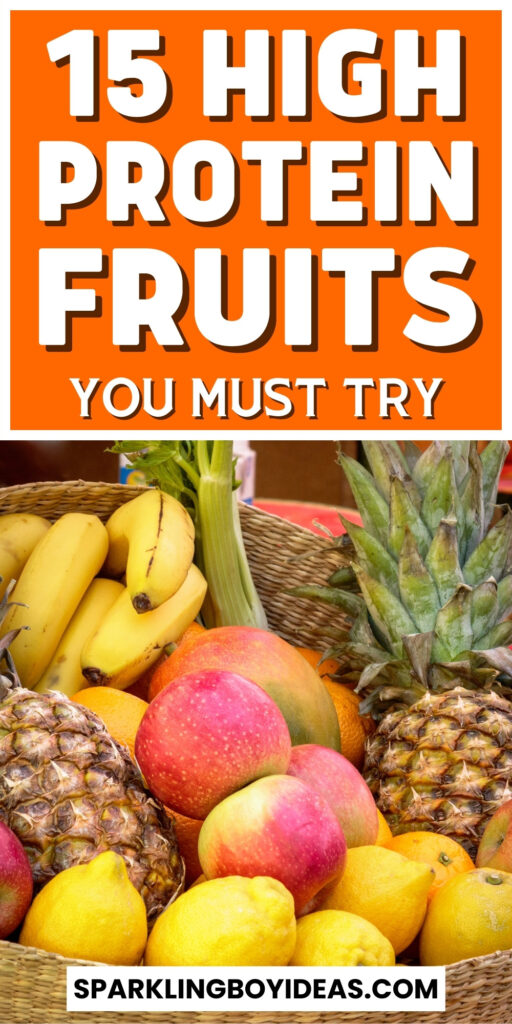Discover a delicious variety of high protein fruits to boost your nutrition! From luscious berries to tropical favorites, explore nature’s high protein foods to add to your lifestyle.

When it comes to getting a protein boost, fruits might not be the first food group that comes to mind.
However, there are several fruits that pack a surprising protein punch alongside their natural sweetness and refreshing flavors.
In this blog, we’ll explore the world of high-protein fruits, uncovering a variety of delicious options that can help supplement your protein intake.
From tropical favorites like guava and passion fruit to nutrient-rich options like avocado and kiwi, we’ll guide you through a collection of simple and easily accessible fruits that offer a substantial protein content.
Join us as we discover the power of high-protein fruits in promoting a healthy and balanced diet, proving that these natural wonders can be both nutritious and delicious.
Benefits of High Protein Fruits
1. Building and Repairing Muscles
Protein is essential for muscle growth and repair.
High-protein fruits provide the necessary amino acids needed to support the development and maintenance of lean muscle mass.
Including these fruits in your diet can aid in post-workout recovery and help you achieve your fitness goals.
2. Boosting Energy Levels
Protein plays a vital role in providing energy to the body.
Consuming high-protein fruits can help increase your energy levels and keep you feeling energized throughout the day.
These fruits provide a sustainable source of energy and can be a great alternative to processed snacks or sugary drinks.
3. Promoting Weight Loss
If you’re looking to shed a few pounds, incorporating high-protein fruits into your diet can be beneficial.
Protein-rich foods help promote satiety and reduce hunger cravings, making you feel fuller for longer.
By including these fruits in your meals or snacks, you can curb your appetite and maintain a healthy weight.
4. Supporting Overall Health
In addition to their protein content, high-protein fruits offer a wide range of vitamins, minerals, and antioxidants.
These nutrients contribute to a strong immune system, improved digestion, and enhanced overall health.
By incorporating these fruits into your diet, you can provide your body with essential nutrients for optimal functioning.
19 High Protein Fruits To Add To Your Diet
1. Avocado
Avocado is a unique fruit known for its creamy texture and healthy fats. It contains approximately 2 grams of protein per medium-sized avocado.
While it may not be as high in protein as some other fruits on the list, avocados provide a good source of monounsaturated fats, dietary fiber, and a wide range of essential nutrients.
2. Guava
Guava is a tropical fruit with a fragrant aroma and sweet flavor.
It is known for its high vitamin C content and also contains about 2.6 grams of protein per cup.
Additionally, guava is rich in dietary fiber, antioxidants, and various vitamins and minerals.
3. Kiwi
Kiwi is a small fruit with a fuzzy brown exterior and vibrant green flesh.
It offers around 2 grams of protein per cup and is a great source of vitamin C, vitamin K, fiber, and antioxidants.
Kiwi also contains enzymes that aid in digestion and promote a healthy gut.
4. Blackberries
Blackberries are juicy and flavorful fruits that are packed with beneficial nutrients.
They provide approximately 2 grams of protein per cup and are rich in antioxidants, fiber, vitamins C and K, and manganese.
Blackberries also offer numerous health benefits, including improved brain function and enhanced immune system support.
5. Apricots
Apricots are small, golden fruits with a tangy-sweet taste.
They contain roughly 2 grams of protein per cup and are abundant in vitamins A and C, fiber, and antioxidants.
Apricots are known to support eye health, aid in digestion, and promote healthy skin.
6. Pomegranate
Pomegranate is a unique fruit with vibrant red seeds, known as arils.
It offers about 3 grams of protein per cup and is loaded with antioxidants, vitamin C, and vitamin K.
Pomegranate has been associated with various health benefits, including reduced inflammation and improved heart health.
7. Passion Fruit
Passion fruit is a tropical fruit with a tart and aromatic flavor.
It provides around 5 grams of protein per cup and is a great source of dietary fiber, antioxidants, and vitamins A and C.
Passion fruit has been linked to improved digestion, reduced blood pressure, and enhanced immune function.
8. Mulberries
Mulberries are small, sweet fruits that come in various colors, including black, red, and white.
They contain approximately 2 grams of protein per cup and are rich in antioxidants, vitamin C, and iron.
Mulberries have been shown to have anti-inflammatory properties and may help regulate blood sugar levels.
9. Jackfruit
Jackfruit is a large tropical fruit with a fibrous texture and a unique flavor that resembles a combination of pineapple and banana.
It offers about 3 grams of protein per cup and is a good source of dietary fiber, vitamin C, and antioxidants.
Jackfruit is often used as a meat substitute in vegetarian and vegan dishes due to its texture and versatility.
10. Blackcurrants
Blackcurrants are small, dark berries known for their tart flavor.
They provide approximately 2 grams of protein per cup and are high in vitamin C, antioxidants, and anthocyanins.
Blackcurrants have been associated with improved cardiovascular health, brain function, and eye health.
11. Durian
Durian is a large fruit with a spiky exterior and a distinctive odor.
It contains around 4 grams of protein per cup and is a good source of dietary fiber, vitamin C, and various minerals.
Durian is also rich in healthy fats and provides a range of essential nutrients.
12. Raspberries
Raspberries are sweet and tangy berries that are rich in flavor and nutrients.
They offer approximately 1.5 grams of protein per cup and are packed with antioxidants, fiber, and vitamin C.
Raspberries have been linked to improved heart health, reduced inflammation, and enhanced cognitive function.
13. Cherimoya
Cherimoya is a tropical fruit with a creamy, custard-like texture and a sweet, tropical flavor.
It provides about 3 grams of protein per cup and is a good source of vitamin C, fiber, and antioxidants.
Cherimoya is also rich in minerals like potassium and magnesium.
14. Guanabana (Soursop)
Guanabana, also known as soursop, is a large tropical fruit with a spiky green exterior and soft white flesh.
It contains approximately 2 grams of protein per cup and is packed with vitamin C, fiber, and antioxidants.
Guanabana has been associated with potential anticancer properties and immune system support.
15. Starfruit
Starfruit, also known as carambola, is a fruit with a distinctive star-like shape when sliced.
It offers around 1 gram of protein per cup and is a good source of vitamin C, fiber, and antioxidants.
Starfruit is low in calories and can be enjoyed as a refreshing snack.
16. Lychee
Lychee is a small, sweet fruit with a rough, red exterior and juicy flesh.
It provides approximately 1.5 grams of protein per cup and is rich in vitamin C, copper, and antioxidants.
Lychee is known for its potential to boost the immune system and promote healthy skin.
17. Elderberries
Elderberries are small, dark purple berries that grow in clusters.
They offer about 1 gram of protein per cup and are high in antioxidants, vitamin C, and dietary fiber.
Elderberries have been used for centuries as a natural remedy for cold and flu symptoms and are known for their immune-boosting properties.
18. Persimmon
Persimmon is a sweet fruit with a smooth, orange exterior and jelly-like flesh.
It contains approximately 1 gram of protein per medium-sized fruit and is a good source of fiber, vitamin C, and manganese.
Persimmons are also rich in antioxidants and have been associated with improved eye health and heart health.
19. Papaya
Papaya is a tropical fruit with vibrant orange flesh and a sweet taste.
It provides around 2 grams of protein per cup and is rich in vitamin C, fiber, and antioxidants.
Papaya contains an enzyme called papain, which aids in digestion and may have anti-inflammatory effects.
How to Incorporate High-Protein Fruits Into Your Diet
Now that you know about the various high-protein fruits available, let’s explore some simple ways to include them in your daily diet:
1. Adding Fruits to Smoothies and Shakes: Blend your favorite high protein fruits with a liquid base, such as almond milk or yogurt, to create a delicious and nutritious smoothie or shake.
2. Snacking on Fresh Fruits: Keep a bowl of washed and cut high protein fruits in your refrigerator for quick and healthy snacking throughout the day.
3. Including Fruits in Salads and Yogurt: Add diced high protein fruits to your salads or mix them into your yogurt for a refreshing and protein-packed meal or snack.
Incorporating high-protein fruits into your diet not only enhances your protein intake but also adds variety and flavor to your meals, making healthy eating enjoyable and satisfying.
FAQs
Q. Can high protein fruits help with muscle recovery after exercise?
Yes, high protein fruits can contribute to muscle recovery as they provide essential amino acids needed for repairing and building muscles.
Q. Are high protein fruits suitable for weight loss?
Yes, including high protein fruits in your diet can support weight loss efforts as they help keep you feeling fuller for longer, reducing the urge to snack on unhealthy foods.
Q. How can I incorporate high protein fruits into my breakfast?
You can add sliced high protein fruits to your oatmeal, cereal, or yogurt, or enjoy them as a side dish alongside your morning meal.
Q. Are high protein fruits suitable for a vegan or vegetarian diet?
Absolutely! High protein fruits are an excellent plant-based protein source, making them suitable for vegan and vegetarian diets.
Q. Can I consume high protein fruits if I have certain dietary restrictions or allergies?
It’s essential to consider any dietary restrictions or allergies you may have and consult with a healthcare professional if needed. However, most high protein fruits are generally well-tolerated by the majority of people.







